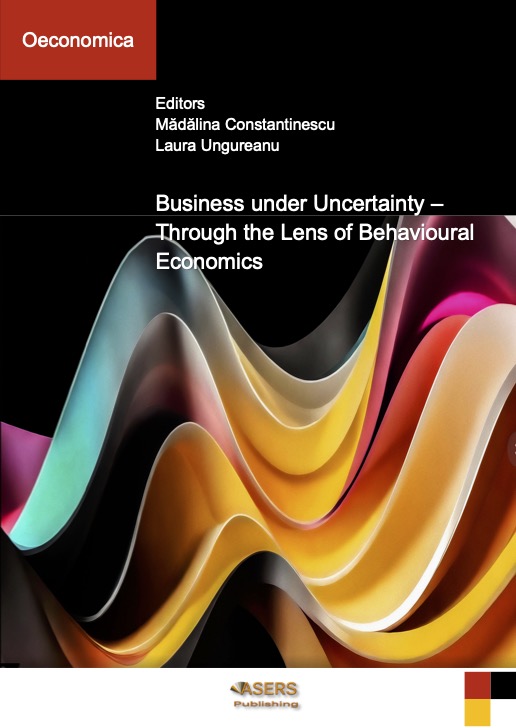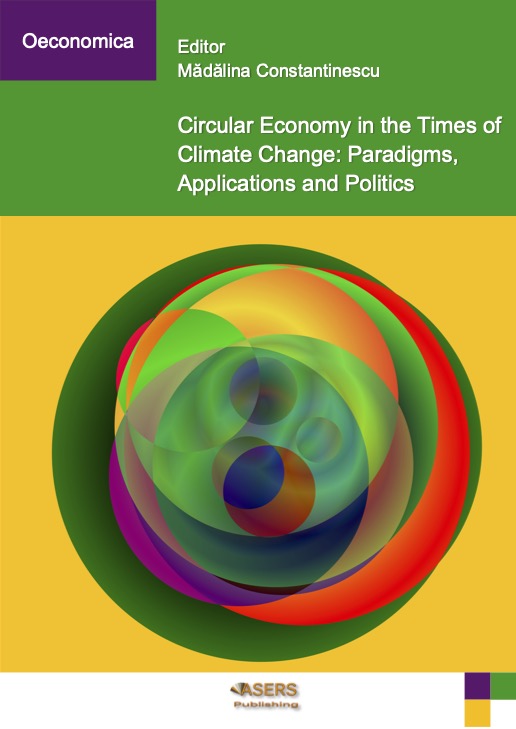Theoretical and Practical Research in Economic Fields announces open calls for manuscripts submission for Volume XV, Issue 2(30), Summer 2024.
Journal of Environmental Management and Tourism announces open calls for manuscripts submission for Volume XV, Issue 2(74), Summer 2024.
Journal of Advanced Research in Law and Economics announces open calls for manuscripts submission for Volume XII, Issue 2(52) Summer 2024
Journal of Mathematical Economics and Finance announces open calls for manuscripts submission for Volume X, Issue 1(18), Summer 2024
Journal of Research in Educational Sciences announces open calls for manuscripts submission for Volume XV, Issue 1(17), Summer 2024

A book edited and curated by
PhD Mădălina Constantinescu, Spiru Haret University, Romania
madalina.constantinescu@spiruharet.ro
and PhD Laura Ungureanu, Spiru Haret University, Romania
DOI: https://doi.org/10.14505/buu.2024.00
eISBN: 978-606-8689-61-6
to be published by ASERS Publishing in Oeconomica Collection
We are excited to announce the call for chapter contributions to the highly anticipated ‘Business under Uncertainty – Through the Lens of Behavioural Economics.’ This comprehensive book, part of Oeconomica Collection published by ASERS Publishing, aims to explore diverse perspectives, insights, and research on various aspects of Behavioural Economics and Applied Statistics in Social Sciences, presenting a holistic understanding of the paradigms, applications, politics and limitations.
We invite interested authors and experts in Economics, Behavioural Economics, and Applied Statistics to contribute their valuable insights to this groundbreaking publication. This is an excellent opportunity to share your research, contribute to the academic discourse, and make a lasting impact in the field.
The rise of behavioural approaches in economics has been one of most significant developments in the study of economic decision-making in recent years. The increasingly acknowledged failings of standard models of choice to explain economic decisions has prompted economists to incorporate into their analysis psychological insights into individual behaviour, such as social cognitive and emotional biases. This book introduces the topic of behavioural economics to a beginning readership, explaining its approach and methodology and assessing its successes and weaknesses.
The book aims to explore how Behavioural Economics has advanced our understanding of human preferences including notions of fairness, reciprocity and inequality aversion, and the mental processes involved in decision making, which vary with the complexity of the decision and the ability of the decision-maker to process the information. The decision-making of individuals within social and economic groups is explored, including financial practitioners and what this can mean for financial markets. Finally, the book looks at the ways in which findings from behavioural economics have been used to alter the decisions people make, such as the nudge approach, and the ethics of such persuasion.
In the same time, the book aims to be a comprehensive statistics book providing extensive, yet highly accessible, coverage of important issues in fundamental research design and statistical analysis and newer recommendations in how to conduct statistical analysis and report results ethically
The Editors focus on practical applications of the concepts, rather than typical ‘textbook’ applications, in a friendly and uncomplicated way with friendly text and plenty of helpful diagrams and tables.. The focus on meaning rather than the mechanics of computation is also a strength.”
The book editors aim to bring together a set of high-quality chapters that present cutting edge empirical research, new conceptualizations, and evidence-based and innovative approaches and viewpoints of Behavioural Economics and Applied Statistics in Social Sciences in a risky business environment. Thus, the book editors invite chapter manuscripts that present: conceptual contributions; empirical scholarly contributions; contributions presenting the views of practioners.
Topics of Interest that we hope this book will explore, include, but are not limited to: Behavioural Economics; Behavioural Labour Economics; Behavioural microfoundations; Behavioural Public Policy; Culture and Ethics; Health Behaviours; Neuroeconomics; Applied Statistics in Social Sciences; Statistical Methods for Psychology; Descriptive Statistics for Psychological Research; Psychological Methods and Statistics; Behavioural Sciences; Risk Analyse and Business.
ASERS Publishing is dedicated to publishing exclusively peer-reviewed papers and books. All scientific works are subject to double blind peer-review prior publishing. ASERS Publishing is a member of the Committee on Publication Ethics (COPE), and all participating referees and Academic Editors are instructed to review submitted scientific works in line with the COPE Ethical Guidelines for Peer-Reviewers where applicable.
Flat rate Chapter Processing Charge for manuscripts up to 20 pages. Authors or their institutions/funding bodies will need to pay the CPC following acceptance after peer review. The cost of publication in digital format is 250 euro/ chapter.
We seek both theoretical and empirical chapters that tackle the issues of Behavioural Economics and Applied Statistics in Social Sciences by addressing one or more of the above-mentioned topics of interest.
The text will be made up of about ten chapters submitted by different authors, and organized by the editor.
Each chapter should contain an original analysis. We expect a critical analysis and the consideration of the different points of view within the area should be addressed.
Authors will be expected to work in close collaboration with the editors to ensure the above-mentioned expectations are met. Additionally, all authors will be expected to review at least one of the other accepted chapters.
'Business under Uncertainty – Through the Lens of Behavioural Economics' will be published in digital and print format (on demand) with eISBN/ ISBN and DOI assigned. Each chapter will be carefully double reviewed by the Editors and Scientific Editorial Board of ASERS Publishing and they will check the proposals with iThenticate in order to identify potential similarities.
The book and chapters will be disseminated worldwide, abstracted and send to be evaluated for inclusion in the following databases: CEEOL, EBSCO, EconLit, RePEC, JStore, SCOPUS, Clarivate – Web of Knowledge, WorldCat, and Cabell’s Directory.
Please send us an abstract of your proposed chapter, not exceeding 500 words, on or before the 15th of June, 2024.
Proposals will be treated on a first-come, first-served basis, so early submissions are encouraged.
Abstract proposals should be forwarded to the editors:
PhD Mădălina Constantinescu, Spiru Haret University, Romania (madalina.constantinescu@spiruharet.ro)
PhD Laura Ungureanu, Spiru Haret University, Romania (laura.ungureanu@spiruharet.ro)
Abstract Submission Deadline: 30th of June, 2024
Notification of Acceptance: 15th of July, 2024
First Chapter Draft Submission Deadline: 1st of September, 2024
First Round of Reviews: 15th of September, 2024
Second Round of Reviews: 30th of September, 2024
Full Chapter Submission Deadline: 1st of October, 2024
Expected Publication: 1st of November, 2024
Please feel free to share this call for contributions with colleagues and networks who may be interested.

A book edited and curated by PhD Laura Ungureanu, Spiru Haret University, Romania
and PhD Paraskevi Theofilou
General Hospital of Thoracic Diseases SOTIRIA, Athens, Greece
Hellenic Open University, School of Social Sciences, Patra, Greece
Lab of Experimental and Applied Psychology, SCG-Scientific College of Greece, Athens, Greece
DOI: https://doi.org/10.14505/PoP.2024.00
eISBN: 978-606-8689-62-3
to be published by ASERS Publishing in Oeconomica Collection
Business Analysis focuses on improving processes within organizations. While data is crucial, it's equally important to recognize the human behaviours and interactions that shape the business landscape. Psychology becomes a powerful tool for a Business Analyst to understand these human dynamics. Here's why we would like to invite you to contribute a chapter to an upcoming edited book titled ‘The Power of Psychology in Business Analysis. Statistics and Trends.’
Therefore, new research questions have appeared, but also the need to build politics as close as possible to the capacity and characteristics of individuals. From this point of view, this volume wants to approach new theories of human decision, passing through those that concern human behaviour from an economic, psychological, and multidisciplinary perspective.
This range of theories involves a mixture of approaches that come from psychology and economics, combining quantitative and qualitative research methods as well as mathematical formalization. Certainly, decision theories and business analyses can be considered as interdisciplinary approaches that stand at the intersection of several paradigms that can enter dialogue through this analysis framework.
Psychology in business analysis is essential for understanding human behaviour in the context of business decisions. Here are some key aspects that we want to address in this book:
1. Consumer Behavior: Understanding consumer needs, preferences and behaviour is crucial to the success of a business. Psychology helps in identifying the motivations and influences behind purchase decisions, as well as in anticipating changes in customer preferences.
2. Marketing and Advertising: Psychology is often used in developing marketing and advertising strategies. Principles such as persuasion, social influence and emotional marketing are applied to attract and retain customers.
3. Human Resource Management: Within a company, psychology is used to understand employee behavior and manage interpersonal relationships. Issues such as motivation, leaders and team, job satisfaction, career expectations of X-Y-Z Generations and stress management are all influenced by psychological principles.
4. Decision Analysis: Psychology contributes to understanding how people make decisions in the context of business. Theories such as prospect theory or theory of rational behaviour are applied to assess risks and rewards and to improve decision-making processes within an organization.
5. Feedback and Performance Improvement: Psychological understanding of how people receive and react to feedback is essential in improving individual and organizational performance. Psychology can help develop effective feedback processes and manage resistance to change.
6. Data Analytics and Predictivity: Using psychology in data analytics can help develop more accurate predictive models for consumer behaviour, employee performance, or market trends.
In essence, integrating psychology into the Business Analysis toolkit recognizes the connection between data and human behaviour. It allows Business Analysts to bridge the gap between numerical insights and the intricacies of human dynamics, contributing to a more comprehensive and effective approach in the evolving landscape of Business Analysis. As businesses continue to evolve, understanding not just the data but also the people behind it becomes key to driving meaningful change and innovation.
ASERS Publishing is dedicated to publishing exclusively peer-reviewed papers and books. All scientific works are subject to double blind peer-review prior publishing. ASERS Publishing is a member of the Committee on Publication Ethics (COPE), and all participating referees and Academic Editors are instructed to review submitted scientific works in line with the COPE Ethical Guidelines for Peer-Reviewers where applicable.
Flat rate Chapter Processing Charge for manuscripts up to 20 pages. Authors or their institutions/funding bodies will need to pay the CPC following acceptance after peer review. The cost of publication in digital format is 250 euro/ chapter.
We seek both theoretical and empirical chapters that tackle the issues of Business Analysis and Applied Statistics in Psychology by addressing one or more of the above-mentioned topics of interest.
The text will be made up of about ten chapters submitted by different authors, and organized by the editor.
Each chapter should contain an original analysis. We expect a critical analysis and the consideration of the different points of view within the area should be addressed.
Authors will be expected to work in close collaboration with the editors to ensure the above-mentioned expectations are met. Additionally, all authors will be expected to review at least one of the other accepted chapters.
'The Power of Psychology in Business Analysis. Statistics and Trends' will be published in digital and print format (on demand) with eISBN/ ISBN and DOI assigned. Each chapter will be carefully double reviewed by the Editors and Scientific Editorial Board of ASERS Publishing and they will check the proposals with iThenticate in order to identify potential similarities.
The book and chapters will be disseminated worldwide, abstracted and send to be evaluated for inclusion in the following databases: CEEOL, EBSCO, EconLit, RePEC, JStore, SCOPUS, Clarivate – Web of Knowledge, WorldCat, and Cabell’s Directory.
Please send us an abstract of your proposed chapter, not exceeding 500 words, on or before the 15th of June, 2024.
Proposals will be treated on a first-come, first-served basis, so early submissions are encouraged.
Abstract proposals should be forwarded to the editors:
PhD Laura Ungureanu, Spiru Haret University, Romania (laura.ungureanu@spiruharet.ro)
and PhD Paraskevi Theofilou, General Hospital of Thoracic Diseases SOTIRIA, Athens, Greece
Hellenic Open University, School of Social Sciences, Patra, Greece
Lab of Experimental and Applied Psychology, SCG-Scientific College of Greece, Athens, Greece
Abstract Submission Deadline: 30th of June, 2024
Notification of Acceptance: 15th of July, 2024
First Chapter Draft Submission Deadline: 1st of September, 2024
First Round of Reviews: 15th of September, 2024
Second Round of Reviews: 30th of September, 2024
Full Chapter Submission Deadline: 1st of October, 2024
Expected Publication: 1st of November, 2024
Please feel free to share this call for contributions with colleagues and networks who may be interested.

A book edited and curated by PhD Mădălina Constantinescu
Spiru Haret University, Romania madalina.constantinescu@spiruharet.ro
DOI: https://doi.org/10.14505/cetcc.2024.00
eISBN: 978-606-8689-63-0
to be published by ASERS Publishing in Oeconomica Collection
We are excited to announce the call for chapter contributions to the highly anticipated ‘Circular Economy in the Times of Climate Change: Paradigms, Applications and Politics.’ This comprehensive book, part of Oeconomica Collection published by ASERS Publishing, aims to explore diverse perspectives, insights, and research on various aspects of circular economy, presenting a holistic understanding of the paradigms, applications, politics and limitations.
We invite interested authors and experts in Circular economy to contribute their valuable insights to this groundbreaking publication. This is an excellent opportunity to share your research, contribute to the academic discourse, and make a lasting impact in the field.
The book editor aims to bring together a set of high-quality chapters that present cutting edge empirical research, new conceptualizations, and evidence-based and innovative approaches and viewpoints to circular economy in the times of climate change. Thus, the book editor invites chapter manuscripts that present: conceptual contributions; empirical scholarly contributions; contributions presenting the views of practioners.
Topics of Interest that we hope this book will explore, include, but are not limited to: Conceptualization of circular economy; Critiques of the circular economy; The Circular Economy: A review of definitions, processes and impacts; Circular economy business models; Circular economy indicators: A systematic review for measuring circular economy; Circular economy - global perspectives and challenges; Mapping the social dimension of the circular economy; Environmental Economics of the circular economy; Climate change and its impact upon circular economy; Sustainable circular economy and circular society; Paradigms, Applications and Politics of circular economy.
ASERS Publishing is dedicated to publishing exclusively peer-reviewed papers and books. All scientific works are subject to double blind peer-review prior publishing. ASERS Publishing is a member of the Committee on Publication Ethics (COPE), and all participating referees and Academic Editors are instructed to review submitted scientific works in line with the COPE Ethical Guidelines for Peer-Reviewers where applicable.
Flat rate Chapter Processing Charge for manuscripts up to 20 pages. Authors or their institutions/funding bodies will need to pay the CPC following acceptance after peer review. The cost of publication in digital format is 250 euro/ chapter.
We seek both theoretical and empirical chapters that tackle the issue of circular economy by addressing one or more of the above mentioned topics of interest.
The text will be made up of about ten chapters submitted by different authors, and organized by the editor.
Each chapter should contain an original analysis. We expect a critical analysis and the consideration of the different points of view within the area should be addressed.
Authors will be expected to work in close collaboration with the editor to ensure the above-mentioned expectations are met. Additionally, all authors will be expected to review at least one of the other accepted chapters.
Please send us an abstract of your proposed chapter, not exceeding 500 words, on or before the 15th of June, 2024.
Proposals will be treated on a first-come, first-served basis, so early submissions are encouraged.
Circular Economy in the Times of Climate Change: Paradigms, Applications and Politics will be published in digital and print format (on demand) with eISBN/ ISBN and DOI assigned. Each chapter will be carefully double reviewed by the Editors and Scientific Editorial Board of ASERS Publishing and they will check the proposals with iThenticate in order to identify potential similarities.
The book and chapters will be disseminated worldwide, abstracted and send to be evaluated for inclusion in the following databases: CEEOL, EBSCO, EconLit, RePEC, JStore, SCOPUS, Clarivate – Web of Knowledge, WorldCat, and Cabell’s Directory.
Abstract proposals should be forwarded to the editor:
PhD Mădălina Constantinescu, Spiru Haret University, Romania (madalina.constantinescu@spiruharet.ro).
Abstract Submission Deadline: 30th of June, 2024
Notification of Acceptance: 15th of July, 2024
First Chapter Draft Submission Deadline: 1st of September, 2024
First Round of Reviews: 15th of September, 2024
Second Round of Reviews: 30th of September, 2024
Full Chapter Submission Deadline: 1st of October, 2024
Expected Publication: 1st of November, 2024
Please feel free to share this call for contributions with colleagues and networks who may be interested.